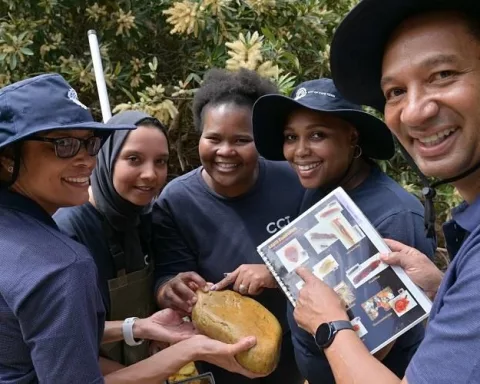Dr. James Keaveney, a renowned physicist at the University of Cape Town, has been awarded the New Frontiers Research Award for his work on affordable medical imaging for cancer research. His goal is to improve the efficiency and cost-effectiveness of Positron Emission Tomography (PET) scanning, which is essential for detecting various health conditions, by implementing quantum-dot nanocrystals. This innovation has the potential to upgrade PET efficiency and expand its use to other areas. Keaveney’s recognition highlights the transformative power of groundbreaking research, and the award’s substantial investment aims to strengthen and advance South Africa’s research excellence.
Dr. James Keaveney, an esteemed physicist at the University of Cape Town, has been awarded the New Frontiers Research Award from the Oppenheimer Memorial Trust for his work on affordable medical imaging for cancer research. He aims to develop techniques that improve the efficiency and cost-effectiveness of Positron Emission Tomography scanning, utilizing quantum-dot nanocrystals to substantially upgrade PET efficiency and extend its application to other areas.
Dr. James Keaveney, an esteemed physicist at the University of Cape Town (UCT), stands at the forefront of scientific exploration and innovation, earning him the distinguished New Frontiers Research Award from the Oppenheimer Memorial Trust (OMT). Keaveney’s worldwide acclaim as a physicist is underscored by his numerous publications and frequent citations. As the national coordinator for approximately 100 South African physicists and engineers, he plays a crucial role in the multinational particle physics project ATLAS, orchestrated by the European Council for Nuclear Research (CERN), located in Geneva, Switzerland. Keaveney’s achievement is quite significant – he was one of eight individuals selected for interviews among an expansive applicant pool of 101 representing diverse disciplines, from literature to astrophysics.
Leveraging Innovation for Low-cost Medical Imaging
Keaveney’s vision for the New Frontiers Research Award focuses on a critical global issue: affordable medical imaging for cancer research. His primary goal is to develop techniques that improve the efficiency and cost-effectiveness of Positron Emission Tomography (PET) scanning, an essential diagnostic tool for detecting various health conditions such as cancers, tissue damage, tuberculosis (TB), and more. Given the prevalence of TB in South Africa and its global status as the leading infectious cause of death after Covid-19, the significance of his efforts is immense.
Regrettably, PET scanning’s pivotal role in diagnosing and monitoring these conditions is undermined by its inaccessibility in middle and low-income countries, including South Africa, due to exorbitant costs. Keaveney aims to tackle this challenge by developing and implementing quantum-dot nanocrystals. These tiny materials serve as highly sensitive detectors and are more economical than their current counterparts. This innovation holds the promise to substantially upgrade PET efficiency and extend its application to other areas such as cardiovascular diseases, infectious diseases, stem-cell tissue repair, inflammation, pediatrics, and prenatal care.
Realization of a Dream: Beyond Personal Research
Keaveney’s work represents the fulfillment of his aspiration: the ability to innovate and explore fields of research that bear personal significance. However, his ambitions extend beyond personal research. He seeks to catalyze international interdisciplinary collaboration and nurture future scientists in his field. To realize this objective, he plans to collaborate with specialists in artificial intelligence and machine learning, as well as nano-electronics at UCT, the African Institute for Mathematical Science (AIMS), CERN, and other global institutions.
Keaveney is optimistic that his ambitious undertaking would reshape the detector technology field. The New Frontiers Research Award, which commends the proficiency of early to mid-career researchers and affords them the opportunity to expand their knowledge boundaries, is a significant investment geared towards propelling South Africa towards prosperity.
Championing Excellence in Research
Keaveney’s recognition is a testament to the transformative power of groundbreaking research both at the local and global levels. UCT Vice-Chancellor interim Emeritus Professor Daya Reddy supports this view, expressing his faith that this prestigious award will reinvigorate Keaveney’s research endeavors, setting the stage for future knowledge and innovation.
The New Frontiers Research Award offers a substantial amount of R7.5 million to its recipients, who must be affiliated with a South African university and aim to create high-performance teams. With an annual allocation of R1.5 million for research funding over five years, the award accentuates the necessity of supporting and acknowledging exceptional researchers.
Through this substantial investment, the Oppenheimer Memorial Trust aspires to fortify and advance South Africa’s research excellence. The Trust is confident that exceptional individuals like James Keaveney and the teams they assemble will conduct research of international significance, thereby creating work with a far-reaching impact.
1. Who is Dr. James Keaveney and what is he recognized for?
Dr. James Keaveney is a physicist at the University of Cape Town who has been awarded the New Frontiers Research Award for his work on affordable medical imaging for cancer research. He aims to improve the efficiency and cost-effectiveness of Positron Emission Tomography (PET) scanning by implementing quantum-dot nanocrystals.
2. What is the New Frontiers Research Award?
The New Frontiers Research Award is a prestigious award offered by the Oppenheimer Memorial Trust to early to mid-career researchers affiliated with a South African university who aim to create high-performance teams. The award offers a substantial amount of R7.5 million to its recipients, with an annual allocation of R1.5 million for research funding over five years.
3. What is the significance of PET scanning in detecting health conditions?
PET scanning is an essential diagnostic tool for detecting various health conditions such as cancers, tissue damage, tuberculosis (TB), and more.
4. How does quantum-dot nanocrystals enhance PET scanning?
Quantum-dot nanocrystals serve as highly sensitive detectors and are more economical than their current counterparts. This innovation holds the promise to substantially upgrade PET efficiency and expand its use to other areas such as cardiovascular diseases, infectious diseases, stem-cell tissue repair, inflammation, pediatrics, and prenatal care.
5. What is the Oppenheimer Memorial Trust’s goal in offering the New Frontiers Research Award?
Through this substantial investment, the Oppenheimer Memorial Trust aspires to fortify and advance South Africa’s research excellence. The Trust is confident that exceptional individuals like James Keaveney and the teams they assemble will conduct research of international significance, thereby creating work with a far-reaching impact.
6. What is Dr. James Keaveney’s vision beyond personal research?
Dr. James Keaveney seeks to catalyze international interdisciplinary collaboration and nurture future scientists in his field. He plans to collaborate with specialists in artificial intelligence and machine learning, as well as nano-electronics at UCT, the African Institute for Mathematical Science (AIMS), CERN, and other global institutions.










